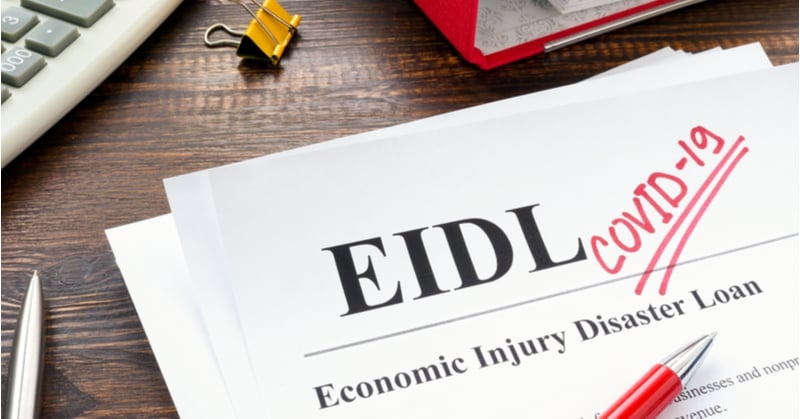Whether your clients are applying for a new disaster loan or need information during the repayment process, there is a lot you need to know. After all, clients look to you as their greatest resource for all things financial, more often than not. But, what should your clients know about COVID disaster loans? And, how can you make sure your clients are prepared?
Planning a disaster response can be stressful. If your clients want to learn more about the aid available, share Patriot Software’s FREE guide, “Business Guide to Navigating Through Disasters & Emergencies.”
COVID disaster loans overview
The Small Business Association (SBA) offers COVID-19 Economic Injury Disaster Loans (EIDLs) to small businesses and nonprofit organizations. Small businesses in all 50 states, D.C., and U.S. territories can submit EIDL applications.
Disaster loans are directly from the SBA, and businesses must repay the loans. Each loan is low-interest and long-term with a fixed rate. The purpose of the loans is to help small businesses overcome the effects of the COVID-19 pandemic by providing financial assistance to meet operating expenses.
Operating expenses include:
- Payroll
- Rent or mortgage payments
- Utilities
- Business debts (past, present, or future)
- Other typical, ordinary business expenses
What is the maximum loan amount?
Before September 8, 2021, the maximum loan amount a business could receive was $500,000. After September 8, 2021, the maximum loan amount is $2 million.
Applicants seeking more than $25,000 must provide collateral. Loans greater than $200,000 must include a personal guarantee. The SBA may take real estate as collateral for loans of $500,000 or more.
What are the loan term and interest rates?
The current loan term is 30 years. Interest rates vary based on the type of business. For-profit businesses receive a 3.75% interest rate. Nonprofits have a 2.75% interest rate.
What should clients know about payments and fees?
Businesses that receive a COVID-19 EIDL loan receive two years of payment deferrals. During the two years of payment deferrals, interest accrues. After the payment deferral period ends, businesses must repay the loan amount, both principal and interest, over the next 28 years.
Business owners who choose to pay early do not receive a prepayment penalty.
The SBA does not charge an application fee for businesses applying for a loan of $25,000 or less. However, for loans of more than $25,000, the SBA charges a one-time $100 filing fee for filing a lien on the business’s assets plus the costs to file a lien on real estate, if applicable.
If a business applies for a loan of $500,000 or more and the SBA takes real estate as collateral, the SBA charges a one-time $100 fee for filing a lien on the business’s assets. And, the borrowing business is responsible for recording the real estate lien and paying the fees for the lien.
Can your clients apply for an EIDL increase if they already received an EIDL?
Your clients can apply for an increase to the EIDL amount if they have already applied for and received COVID-19 EIDL funding. However, your clients must not already have a loan increase application in process. And, clients must confirm their eligibility through the SBA.
What are the eligibility requirements for COVID EIDL loans?
The SBA requires businesses to meet the following criteria to qualify for COVID-19 EIDLs:
- Provide a valid Taxpayer Identification Number (TIN) issued by the IRS
- Each member, owner, partner, or shareholder of 20% or more of the business must be a U.S. citizen, non-citizen national, or qualified alien with a Social Security number
- Meet the COVID EIDL small business size requirements
- Have been operating on or before January 31, 2020 (including businesses that were in the planning stages but not formally open for business)
And, the SBA requires specific credit scores to qualify for EIDL, depending on the requested loan amount:
- $500,000 or less: Minimum credit score of 570
- More than $500,000: Minimum credit score of 625
What information do your clients need to apply for a COVID-19 EIDL?
Clients submitting applications for a COVID-19 EIDL, regardless of amount, must gather and submit:
- Federal income taxes
- IRS Form 4506-T*
- ODA Form P-022-Standard Resolution
*Form 4506-T is valid only for 120 days. Clients who have already submitted a Form 4506-T for another SBA loan or grant must submit a new form to apply for the COVID-19 EIDL. And, clients applying for an increase must also submit a new form.
If a client seeks a loan of $500,000 or more, they must submit the following three additional documents:
- SBA Form 2022 - Schedule of Liabilities
- SBA Form 413 - Personal Financial Statement
- List of Real Estate Owned
What information should you gather for clients?
Applying for a loan can be intimidating for your clients, especially if they’ve never done it before. Let your clients know what information they need to submit to help your clients apply for a COVID-19 disaster loan.
Business information
Inform your clients to gather the following business information:
- Business legal name used to issue the EIN
- Organization type
- Form used for the 2019 tax return
- Business TIN type
- Franchise information, if applicable*
- Business mailing address (must match IRS records)
- List both physical and mailing addresses if the two differ
- Date the business opened and began making sales
- Date the current ownership was established**
- Business activity
- NAICS code
- Current number of employees (as of January 31, 2020)
*Franchises must use the SBA’s Franchise Directory to confirm the franchise is listed. Use the Franchise Identified Code from the Franchise Directory on the application.
**If more than 50% of the business’s ownership has changed since January 31, 2020, the applicant cannot proceed with the application.
Financial information
Your clients must also provide financial data to apply for a COVID-19 disaster loan. The tax forms and financial information vary by the business entity and structure.
In general, have your clients gather the following information:
- Actual 2019 gross receipts
- Cost of goods sold (COGS)
- Expenses
- Income tax form
Use your clients’ profit and loss statements for the tax year 2019 to view and report their gross receipts, COGS, and expenses. And, use their business structure to determine which income tax form you need to locate.
Are your clients new to your firm? Instruct them where to find this information in their records to provide to you.
Business owner information
Your clients must provide information on all business owners to apply for a disaster loan.
Businesses owned by another entity and not individuals must indicate this on the application and provide owner information for the entity that owns the applicant. Use parent company or corporate owners’ information at this step in the application.
If the business entity has individual owners, list the requested information for all owners with 20% or more ownership. If any individual who owns 20% or more of the applicant business is not a U.S. citizen, non-citizen national, or qualified alien, the entire applicant business is ineligible.
Banking information
The business must have an existing business bank account at the time of submission. After the business applicant submits their application, they must enter the bank account and routing numbers to which the SBA will deposit the funds.
.png?width=150&height=63&name=TWRlogo-regmark_blueblack%20(1).png)
.png)










Do you have questions about this article? Email us and let us know > info@woodard.com
Comments: